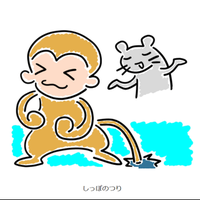しっぽ の つり
しっぽ|の|つり
tail|attributive particle|fishing
尾钓
The Tail of the Fishing
むかし むかしの 、寒い 日 の 事 です 。
むかし|むかしの|さむい|ひ|の|こと|です
long ago|of long ago|cold|day|attributive particle|thing|is
Há muito tempo, em um dia frio.
Once upon a time, on a cold day.
森 に は 木 の 実 が なくなって しまい 、サル は お腹 が ペコペコ でした 。
もり|に|は|き|の|み|が|なくなって|しまい|サル|は|おなか|が|ぺこぺこ|でした
forest|locative particle|topic marker|tree|attributive particle|fruit|subject marker|has disappeared|has ended up|monkey|topic marker|stomach|subject marker|hungry|was
A floresta ficou sem nozes e o macaco estava com fome.
The forest had run out of nuts, and the monkey was very hungry.
ところが 川 に 住む カワウソ は 、毎日 おいし そうな 魚 を お腹 一杯 食べて い ます 。
ところが|かわ|に|すむ|カワウソ|は|まいにち|おいし|そうな|さかな|を|おなか|いっぱい|たべて|い|ます
however|river|locative particle|live|otter|topic marker|every day|delicious|looks delicious|fish|object marker|stomach|full|eating|is|polite ending
No entanto, a lontra do rio come muitos peixes deliciosos todos os dias.
Meanwhile, the otter living in the river was eating delicious fish every day.
サル は 、カワウソ に 聞きました 。
さる|は|カワウソ|に|ききました
monkey|topic marker|otter|locative particle|asked
The monkey asked the otter.
「カワウソ くん 。
カワウソ|くん
otter|a suffix used for boys or young males
"Hey, Otter-kun."},{
どう したら 、そんなに 魚 が 捕れる ん だい ?
どう|したら|そんなに|さかな|が|とれる|ん|だい
how|if you do|so much|fish|subject marker|can catch|you know|right
Wie kann ich so viele Fische fangen?
How can you catch fish so much?
Como você pode pegar tantos peixes?
」すると カワウソ は 、こう 言い ました 。
すると|カワウソ|は|こう|言い|ました
then|otter|topic marker|like this|say|said
Then the otter said,
e a lontra disse:
「そんな の かんたん さ 。
そんな|の|かんたん|さ
such|attributive particle|easy|sentence-ending particle indicating emphasis
"That kind of simplicity.
"É tão fácil.
川 の 氷 に 穴 を 開けて 、尻尾 を 入れる だろう 。
かわ|の|こおり|に|あな|を|あけて|しっぽ|を|いれる|だろう
river|attributive particle|ice|locative particle|hole|object marker|open (te-form)|tail|object marker|will put|probably
You will make a hole in the river ice and put a tail.
Vou fazer um buraco no gelo do rio e colocar uma cauda nele.
それ から 動かず に 、じっと 待つ んだ 。
それ|から|うごかず|に|じっと|まつ|んだ
that|from|without moving|at|still|wait|you see
Então não se mova e espere.
Then, without moving, just wait.
すると 魚 が 、尻尾 を えさ と 間違えて 食らいつく 。
すると|さかな|が|しっぽ|を|えさ|と|まちがえて|くらいつく
then|fish|subject marker|tail|object marker|bait|and|mistake|bite
Então o peixe, confundindo o rabo com isca, o morde.
Then the fish will mistake the tail for bait and bite.
それ を ぐ いっと 、 釣り 上げる ん だ 」 「 へ ぇ ー 。
||||つり|あげる|||||-
Agarre e pegue.” “Ei.
You pull it up with a jerk.
ぼく も やって みよう 」サル は さっそく 川 へ 出かけて 行く と 、カチカチ に こおった 氷 に 穴 を 開けて 尻尾 を たらし ました 。
ぼく|も|やって|みよう|サル|は|さっそく|かわ|へ|でかけて|いく|と|カチカチ|に|こおった|こおり|に|あな|を|あけて|しっぽ|を|たらし|ました
I|also|will do|let's try|monkey|topic marker|right away|river|to|go out|go|quotation particle|hard|locative particle|frozen|ice|locative particle|hole|object marker|open|tail|object marker|dangling|did
Vou tentar também." O macaco foi imediatamente para o rio e fez um buraco no gelo endurecido para enfiar o rabo.
Wow, I want to try it too.
「う ひゃあ ー 、冷た ーい !
う|ひゃあ|ー|つめた|い
u|hyaa|prolongation mark|cold|adjective ending
"Uhhhh, está frio!
Oh wow, it's cold!
」尻尾 が とっても 冷たかった けれど 、サル は 動かず に じっと がまん し ました 。
しっぽ|が|とっても|つめたかった|けれど|サル|は|うごかず|に|じっと|がまん|し|ました
tail|subject marker|very|was cold|but|monkey|topic marker|without moving|locative particle|still|patience|and|did
' Embora a cauda estivesse muito fria, o macaco permaneceu imóvel.
The tail was very cold, but the monkey stayed still and endured.
「待つ んだ 、待つ んだ 。
まつ|んだ|まつ|んだ
wait|you see|wait|you see
"Espera espera.
"Just wait, just wait.
もう すぐ 、 魚 が 食べられる ぞ ー 」 しかし なかなか 、 魚 は 尻尾 に 食いつきません 。
||ぎょ||たべられる||-|||ぎょ||しっぽ||くいつきません
O peixe estará pronto para comer em breve." Mas o peixe não morde o rabo.
Soon, you'll be able to eat fish!" However, the fish did not bite the tail for a long time.
その うち サル は 、ウトウト と いねむり を して しまい ました 。
その|うち|サル|は|ウトウト|と|いねむり|を|して|しまい|ました
that|inside|monkey|topic marker|dozing|and|nap|object marker|doing|ended up|did
Em pouco tempo, o macaco adormeceu.
Before long, the monkey dozed off.
そして 気 が つく と 尻尾 が こおり ついて しまい 、動かす 事 が 出来 ませ ん 。
そして|き|が|つく|と|しっぽ|が|こおり|ついて|しまい|うごかす|こと|が|でき|ませ|ん
and|spirit|subject marker|to stick|quotation particle|tail|subject marker|ice|is stuck|has ended up|to move|thing|subject marker|can|not|you
E antes que eu percebesse, minha cauda estava congelada e eu não conseguia movê-la.
And when it realized, its tail had frozen and it could not move it.
それ を 大きな 魚 が 釣れた と かん違い した サル は 、大喜びで 尻尾 を 引っ張り ました 。
それ|を|おおきな|さかな|が|つれた|と|かんちがい|した|サル|は|おおよろこびで|しっぽ|を|ひっぱり|ました
that|object marker|big|fish|subject marker|caught|quotation particle|misunderstanding|did|monkey|topic marker|very happy|tail|object marker|pulled|did
Pensando que havia pescado um peixe grande, o macaco alegremente puxou seu rabo.
The monkey, who mistook it for a big fish, joyfully pulled on the tail.
「うーん 、重たい な 。
うーん|おもたい|な
hmm|heavy|adjective marker
"Hum, é pesado.
"Hmm, it's heavy.
こいつ は 、よほど 大きな 魚 に 違いない ぞ 」サル は 顔 を 真っ赤に して 、力まかせに 尻尾 を 引っ張り ました 。
こいつ|は|よほど|おおきな|さかな|に|ちがいない|ぞ|サル|は|かお|を|まっかに|して|ちからまかせに|しっぽ|を|ひっぱり|ました
this guy|topic marker|very|big|fish|locative particle|must be|emphasis particle|monkey|topic marker|face|object marker|bright red|doing|with all his strength|tail|object marker|pulling|did
Este deve ser um peixe muito grande." O macaco ficou vermelho brilhante e puxou o rabo com toda a força.
This must be a really big fish," the monkey said, turning red in the face, and pulled on the tail with all its might.
「うーん 、うーん 、うーん 」そして ・・・。
うーん|うーん|うーん|そして
hmm|hmm|hmm|and
"Hmm, hmm, hmm," and then...
ブチン !
Mas em!
Snap!
あまりに も 尻尾 を 力一杯 引っ張った ため 、サル の 尻尾 は 途中 で ちぎれて しまい ました 。
あまりに|も|しっぽ|を|ちからいっぱい|ひっぱった|ため|サル|の|しっぽ|は|とちゅう|で|ちぎれて|しまい|ました
too|also|tail|object marker|with all one's strength|pulled|because|monkey|possessive particle|tail|topic marker|halfway|at|torn|ended up|did
Puxei com tanta força o rabo do macaco que ele se partiu no meio.
Because I pulled the tail too hard, the monkey's tail broke off halfway.
サル の 顔 が 赤くて 尻尾 が 短い の は 、こういう わけ だ そうです 。
サル|の|かお|が|あかくて|しっぽ|が|みじかい|の|は|こういう|わけ|だ|そうです
monkey|attributive particle|face|subject marker|red and|tail|subject marker|short|explanatory particle|topic marker|this kind of|reason|is|that's right
É por isso que os macacos têm rostos vermelhos e caudas curtas.
The reason the monkey's face is red and its tail is short is because of this.
おしまい
fim
The end.
SENT_CWT:AfvEj5sm=6.6 PAR_TRANS:gpt-4o-mini=2.84
en:AfvEj5sm
openai.2025-01-22
ai_request(all=34 err=0.00%) translation(all=28 err=14.29%) cwt(all=265 err=10.19%)

